Pope’s Prayerful Plea for Peace in Lebanon
'Plans for Peace and Not for Woe'
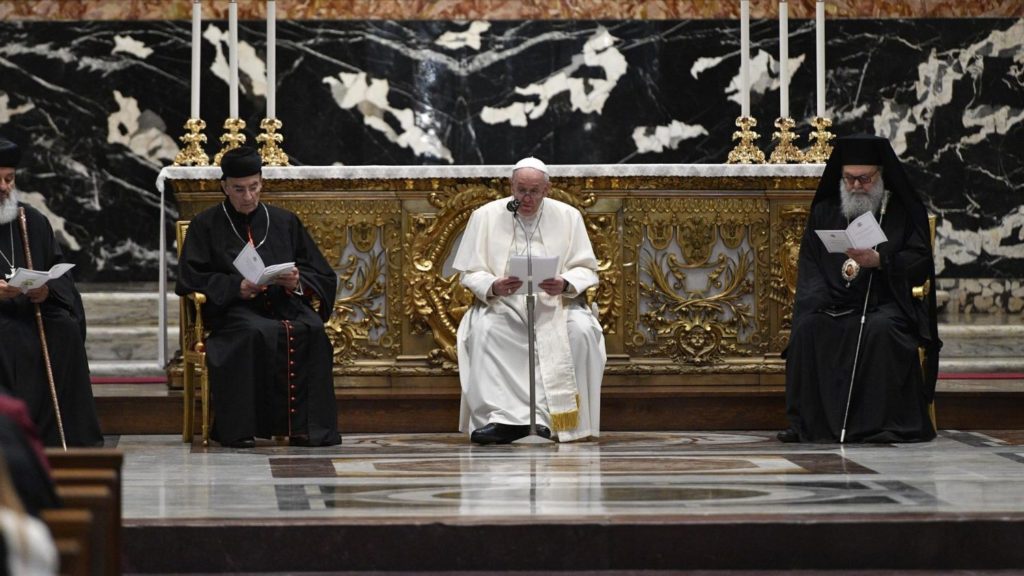
A prayerful plea for peace put a hopeful conclusion to July 1, 2021, the Day of Reflection and Prayer for Lebanon.
Pope Francis delivered the reflection, referring several times to a line from scripture: the Lord declares that he has “plans for peace and not for woe” (Jer 29:11). He also cited the words “Lord, have mercy” (Mt 15:22).
“This was the plea of the woman from the region of Tyre and Sidon, who in her suffering insistently begged Jesus: ‘Lord, help me’ (v. 25),” the Holy Father said. “Today her plea has become that of an entire people, the disillusioned and weary Lebanese people in need of certainty, hope, and peace. With our prayers, we have sought to accompany this plea.”
Pope Francis repeated his desire to visit Lebanon. He encouraged the international community to ensure that the country does not collapse and remains on the path to recovery. And he repeatedly called for prayers for the troubled nation.
“Let us not desist, let us not tire of imploring heaven for that peace which men and women find so difficult to build on earth,” Francis implored. “Let us insistently offer this prayer for the Middle East, and for the beloved country of Lebanon, a treasury of civilization and spirituality that has radiated wisdom and culture down the centuries and bears witness to a singular experience of peaceful coexistence.
“Lebanon cannot be left prey to the course of events or those who pursue their own unscrupulous interests. It is a small yet great country, but even more, it is a universal message of peace and fraternity arising from the Middle East.”
Following is the Holy Father’s full discourse, provided by the Vatican:
Dear brothers and sisters,
We assembled today to pray and reflect, impelled by our deep concern for Lebanon – a country very close to my heart and which I wish to visit – as we see it plunged into a serious crisis. I am grateful to all the participants for having readily accepted the invitation and for their fraternal sharing. Sustained by the prayers of the Holy People of God, in facing this dark situation, we, as pastors, have sought together to be guided by God’s light. And in God’s light, we have seen our own lack of clarity: the mistakes we have made in failing to bear consistent witness to the Gospel, and above all the opportunities we have missed along the path to fraternity, reconciliation, and full unity. For all this, we ask forgiveness, and with contrite hearts, we pray: “Lord, have mercy” (Mt 15:22).
This was the plea of the woman from the region of Tyre and Sidon, who in her suffering insistently begged Jesus: “Lord, help me” (v. 25). Today her plea has become that of an entire people, the disillusioned and weary Lebanese people in need of certainty, hope, and peace. With our prayers, we have sought to accompany this plea. Let us not desist, let us not tire of imploring heaven for that peace which men and women find so difficult to build on earth. Let us insistently offer this prayer for the Middle East, and for the beloved country of Lebanon, a treasury of civilization and spirituality that has radiated wisdom and culture down the centuries and bears witness to a singular experience of peaceful coexistence. Lebanon cannot be left prey to the course of events or those who pursue their own unscrupulous interests. It is a small yet great country, but even more, it is a universal message of peace and fraternity arising from the Middle East.
A phrase from the Scriptures resounded among us today, as if in response to our fervent prayer. In a few short words, the Lord declares that he has “plans for peace and not for woe” (Jer 29:11). Plans for peace and not for woe. In these woeful times, we want to affirm with all our strength that Lebanon is, and must remain, a project of peace. Its vocation is to be a land of tolerance and pluralism, an oasis of fraternity where different religions and confessions meet, where different communities live together, putting the common good before their individual interests. Here I would reiterate how essential it is that “those in power choose finally and decisively to work for true peace and not for their own interests. Let there be an end to the few profiting from the sufferings of many! No more letting half-truths continue to frustrate people’s aspirations!” (Address at the Conclusion of the Dialogue, Bari, 7 July 2018). Stop using Lebanon and the Middle East for outside interests and profits! The Lebanese people must be given the opportunity to be the architects of a better future in their land, without undue interference.
Plans for peace and not for woe. Dear Lebanese brothers and sisters, even in the most difficult moments over the centuries, you have distinguished yourselves by your resourcefulness and industriousness. Your tall cedars, the symbol of the country, evoke the flourishing treasures of a unique history. They remind us that large branches can only grow from deep roots. May you be inspired by the example of those who have gone before you, who saw in diversity not obstacles but possibilities, and could thus build common foundations. Sink your roots in their dreams of peace. Never more than in recent months have we come to realize that we cannot save ourselves alone or remain indifferent to the problems of others. Therefore, we appeal to all of you. Citizens: do not be discouraged, do not lose heart, find in the roots of your history the hope of a new flowering. Political leaders: in accordance with your responsibilities, may you find urgent and durable solutions to the current economic, social and political crisis, mindful that there can be no peace without justice. Beloved Lebanese of the diaspora: place the best energies and resources at your disposal at the service of your homeland. Members of the international community: through joint efforts, may conditions be created so that the country will not collapse, but embark upon a path of recovery. This will be to everyone’s advantage.
Plans for peace and not for woe. As Christians, today we wish to renew our commitment to building a future together. For our future will be peaceful only if it is shared. Human relationships cannot be based on the pursuit of partisan interests, privileges, and advantages. No, the Christian vision of society arises from the Beatitudes; it is born of meekness and mercy, and it inspires us to imitate in this world God’s own way of acting, for he is a father who desires his children to live in peace. We Christians are called to be sowers of peace and builders of fraternity, not nursing past grudges and regrets, not shirking the responsibilities of the present, but looking instead with hope to the future. We believe that God has shown us but one way: the way of peace. Let us, therefore, assure our Muslim brothers and sisters, and those of other religions, of our openness and readiness to work together in building fraternity and promoting peace. For “peace does not call for winners or losers, but rather for brothers and sisters who, despite the misunderstandings and hurts of the past, are journeying from conflict to unity” (Address, Interreligious Meeting, Plain of Ur, 6 March 2021). It is my hope that this day will be followed by concrete initiatives under the aegis of dialogue, of efforts to educate, and of solidarity.
Plans for peace and not for woe. Today we have made our own the hope-filled words of the poet Gibran: beyond the black curtain of the night, there is a dawn that awaits us. Several young people have just given us lighted lamps. The young are themselves lamps burning brightly at his dark hour. Their faces reflect hope for the future. May their voices be heard and heeded, for the country’s rebirth depends on them. May all of us, before making important decisions, learn to look to the hopes and dreams of young people. Let us look too at little children: may their eyes, shining brightly yet brimming with tears, disturb our consciences and guide our decisions. Still, other lights are shining on the horizon: they are women. We think of the Mother of us all, who from the mountain of Harissa, looks out upon those who have come to the country from the Mediterranean. Her hands are outstretched towards the sea and towards Beirut, to embrace the hopes of all. Women generate life and hope for everyone. May they be respected, valued, and included in decision-making processes in Lebanon.
To paraphrase the poet once again, let us recognize that there is no other way to come to the dawn than by passing through the night. And in the night of crisis, all of us need to remain united. Together, through honest dialogue and pure intentions, we can bring light where there is darkness. Let us entrust every effort and commitment to Christ, the Prince of Peace, so that, as we have prayed, “by the uneclipsed rays of his mercy, darkness will flee, twilight vanish, shadows be dispelled and the night recede” (cf. SAINT GREGORY OF NAREK, Book of Lamentations, 41). May the night of conflicts recede before a new dawn of hope. May hostilities cease, disagreements fade away, and Lebanon once more radiate the light of peace.
© Libreria Editrice Vatican
[00952-EN.01] [Original text: Italian]
Related
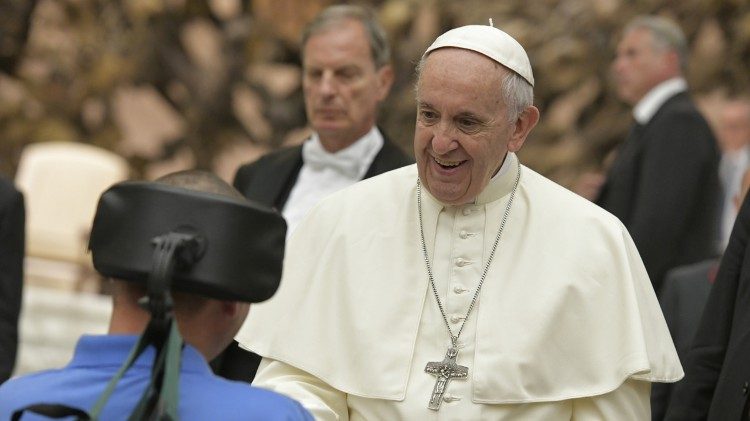
Francis. The Human and Religious Imprint of a Papacy
Isabel Orellana
24 April, 2025
5 min
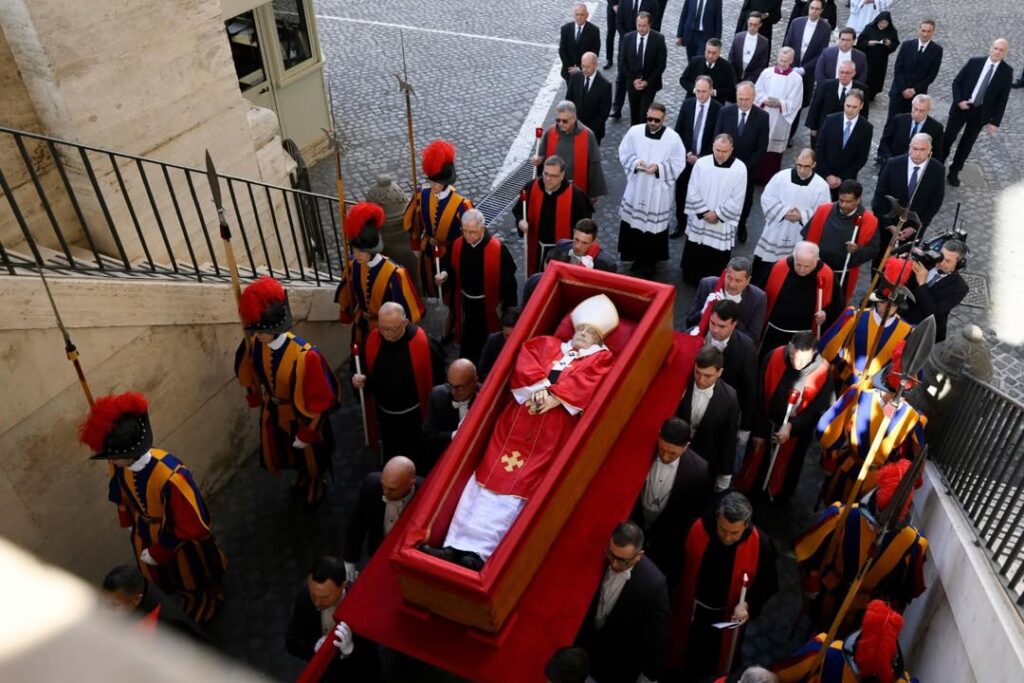
A Pope’s Last Journey: Francis’ Body Transferred to St. Peter’s
Exaudi Staff
24 April, 2025
3 min
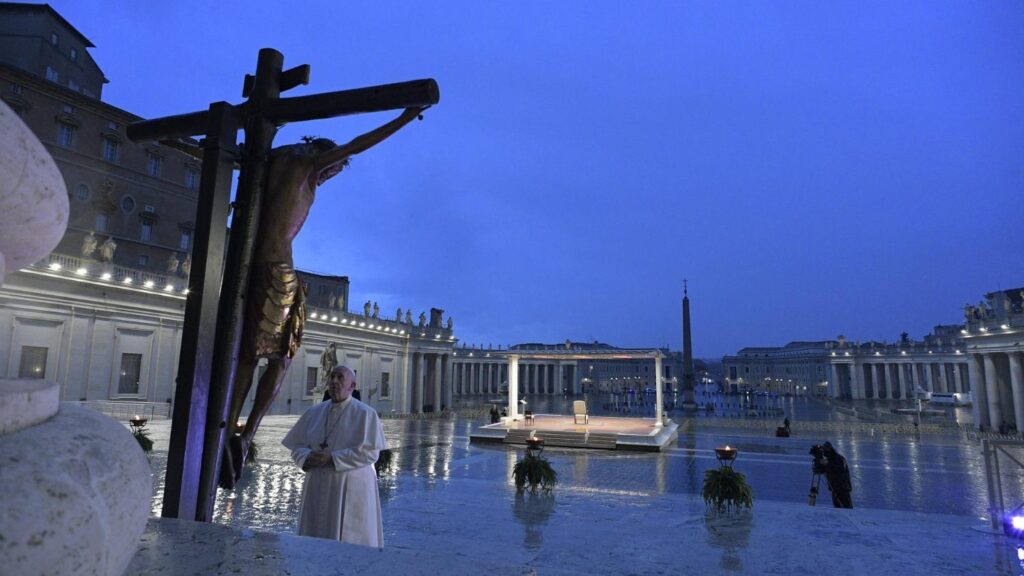
Cardinal Felipe Arizmendi: With the Risen Christ, There Is Hope
Felipe Arizmendi
24 April, 2025
6 min
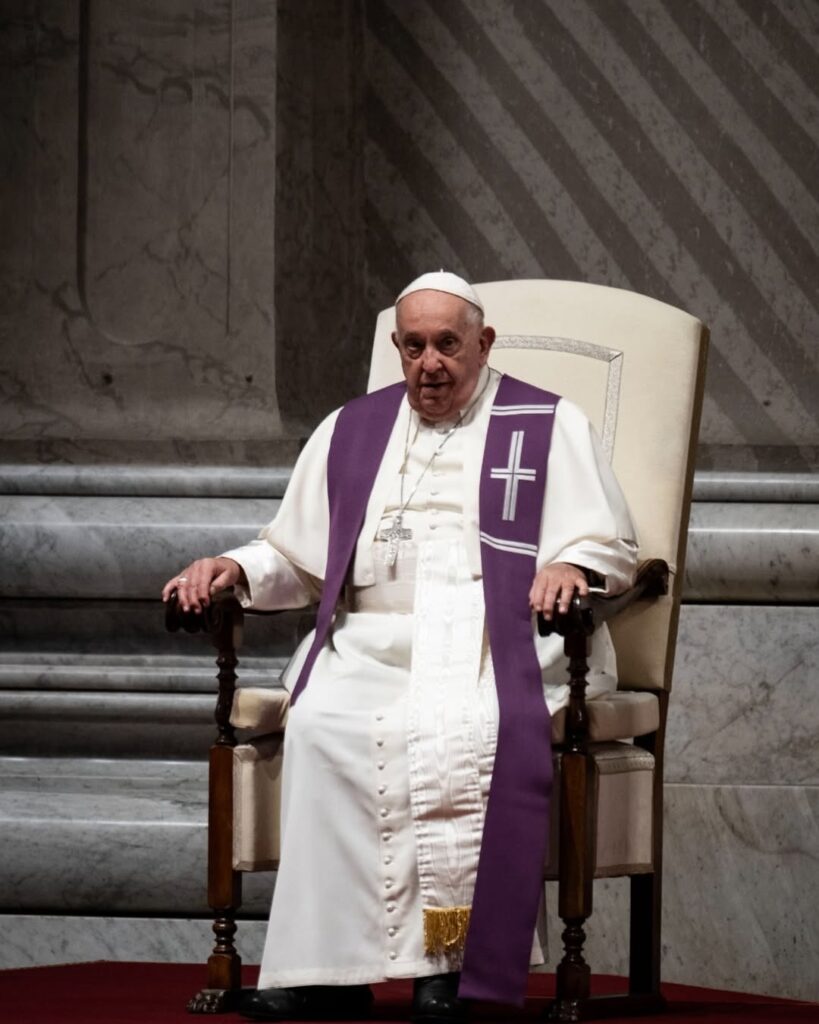
You Didn’t Give Up
Exaudi Staff
23 April, 2025
2 min
 (EN)
(EN)
 (ES)
(ES)
 (IT)
(IT)

